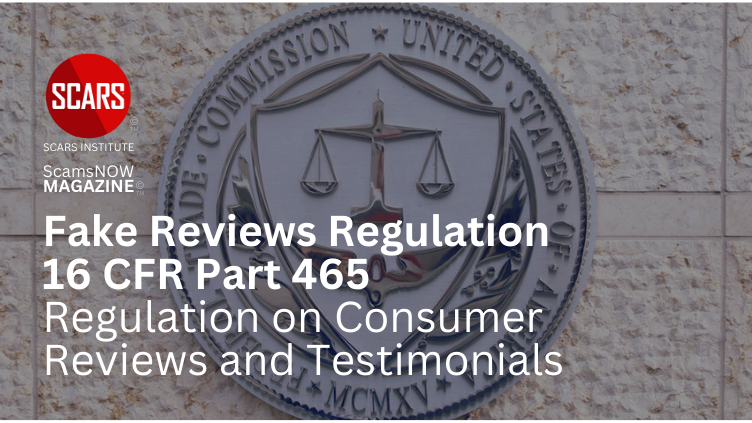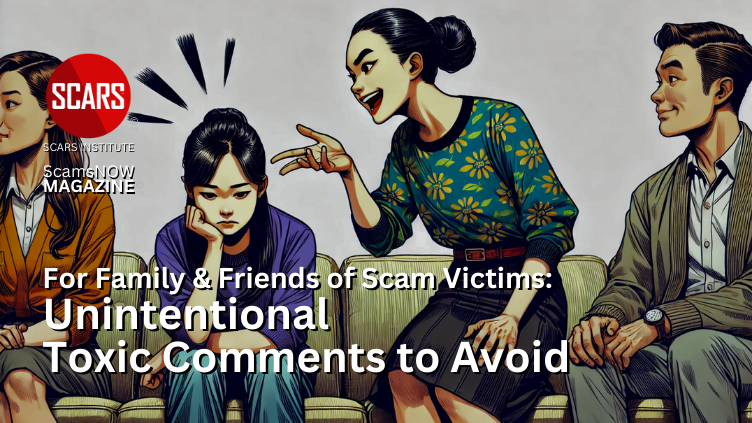Unintentional Toxic Comments to Avoid
The Unintentionally Toxic Comments that Friends and Family, and Advocates Make that are Toxic for Scam Victims-Survivors and That Should Be Avoided
FOR ADVOCATES, FRIENDS, AND FAMILY OF SCAM VICTIMS
Primary Category: Scam Victim Recovery Psychology
Author:
• Vianey Gonzalez B.Sc(Psych) – Licensed Psychologist, Specialty in Crime Victim Trauma Therapy, Neuropsychologist, Certified Deception Professional, Psychology Advisory Panel & Director of the Society of Citizens Against Relationship Scams Inc.
• Tim McGuinness, Ph.D., DFin, MCPO, MAnth – Anthropologist, Scientist, Polymath, Director of the Society of Citizens Against Relationship Scams Inc.
About This Article
Supporting scam victims through recovery requires sensitivity and an awareness of how certain comments can be unintentionally harmful. Statements that blame, minimize, or dismiss their experience can amplify feelings of shame, guilt, and isolation, often deepening their emotional wounds.
Phrases like “You should have known better” or “Just move on” imply a lack of understanding and invalidate their pain, making them feel as though their trauma is unworthy of compassion or attention. Overly simplistic advice, such as “Stay positive” or “Forgive and forget,” minimizes the complex emotional journey of healing, while comparison with others’ experiences can make victims feel insignificant.
These kinds of comments inadvertently discourage victims from expressing themselves and seeking help, underscoring the importance of offering empathy, active listening, and unconditional validation to foster a safe space for healing.

The Unintentional Comments that Friends and Family Make that are Toxic for Scam Victims-Survivors and that should be Avoided
When supporting individuals recovering from trauma, particularly those affected by scams or other forms of emotional abuse, well-intentioned but harmful comments can inadvertently deepen their emotional wounds.
Common statements that blame, minimize, or rush victims to heal often result in shame, isolation, or a sense of being misunderstood. Each type of dismissive or judgmental comment, from oversimplified advice to overt blaming, compounds the trauma, undermining trust and slowing the healing process.
Trauma-informed care emphasizes validation, empathy, and patience, allowing individuals to express their feelings without fear of judgment. Understanding why certain statements are harmful is essential for creating supportive environments where victims can feel safe and valued.
Here’s a list of toxic or inappropriate comments, sayings, and statements often unhelpful or harmful to traumatized victims:
Blaming or Shaming Statements
-
- ‘How could you let this happen to you?’
- ‘Why didn’t you see the red flags?’
- ‘It’s your fault for trusting someone so easily.’
Explanation: Blame and shame comments imply the victim is responsible for their trauma, which can worsen feelings of guilt and self-doubt. Trauma often leads victims to question their own judgment already, and statements like these reinforce a negative internal narrative, making it harder for them to rebuild self-confidence.
Dismissive or Minimizing Remarks
-
- ‘Just move on and get over it.’
- ‘It could have been worse.’
- ‘At least you’re still alive, right?’
- ‘Other people have gone through much worse.’
- ‘Everything happens for a reason.’
Explanation: Minimizing statements disregard the depth of the person’s experience and pain. Trauma often involves deep emotional scars, and dismissing it as “not that bad” can make individuals feel that their feelings are invalid. This can hinder their willingness to express themselves and seek help.
Oversimplified Solutions
-
- ‘Just be positive; everything happens for a reason.’
- ‘You should just forgive and forget.’
- ‘Why don’t you just distract yourself?’
Explanation: Oversimplified advice minimizes the complexity of trauma recovery. Telling someone to “just forgive and forget” assumes trauma is easily overcome, which it’s not. This attitude can cause victims to feel misunderstood, as if they are expected to “snap out of it” rather than go through a gradual healing process.
Unsolicited Advice or Invalidating Emotions
-
- ‘You need to calm down; you’re overreacting.’
- ‘Stop feeling sorry for yourself.’
- ‘Just don’t think about it too much.’
Explanation: These statements suggest that the victim’s emotional response is wrong or excessive, invalidating their pain and self-expression. Trauma often brings intense emotions, and invalidating them can lead to emotional suppression, which hinders healing and can worsen symptoms of anxiety or depression.
Judgmental Questions or Statements
-
- ‘How did you not realize what was happening?’
- ‘I would never let that happen to me.’
- ‘Only weak people fall for those kinds of scams.’
Explanation: Judgmental statements can make victims feel foolish or inferior, increasing feelings of shame and isolation. Trauma often clouds judgment, and many victims already blame themselves. This type of comment reinforces self-blame and can prevent individuals from seeking support, and fearing judgment from others.
Toxic Positivity
-
- ‘Think happy thoughts!’
- ‘You’re too focused on the negative.’
- ‘Don’t let it bring you down; stay strong.’
- ‘The trauma made you stronger.’
Explanation: Toxic positivity denies the victim the space to feel and process their true emotions. The “always stay positive” approach can be dismissive, making individuals feel as if they need to hide their struggles. Authentic healing often requires acknowledging and working through difficult emotions rather than covering them up.
Impatience or Lack of Empathy
-
- ‘You should be over this by now.’
- ‘How much longer are you going to feel this way?’
- ‘Aren’t you done talking about this yet?’
Explanation: Recovery from trauma has no set timeline, and rushing someone’s healing process can create pressure and guilt. Impatience communicates that the listener is tired of the victim’s pain, potentially pushing them toward silence and isolation, which can worsen mental health outcomes.
Statements that Pressure Immediate Recovery
-
- ‘Time heals all wounds, so just give it time.’
- ‘Focus on moving forward, not backward.’
- ‘Why are you still dwelling on the past?’
- ‘What doesn’t kill you makes you stronger.’
- ‘You should get out more.’
- ‘Just try meeting real people.’
Explanation: Encouraging someone to “move on” quickly or “just give it time” oversimplifies the process of recovery. Trauma can involve ongoing challenges and struggles, and pushing immediate recovery implies that lingering pain or difficulties are abnormal or wrong.
Dismissive of the Victim’s Trauma Responses
-
- ‘You’re just being dramatic.’
- ‘It’s not that big of a deal.’
- ‘That’s just life—deal with it.’
Explanation: These comments invalidate the victim’s experience, making them feel misunderstood and unsupported. By calling their response “dramatic” or trivial, the individual may suppress their emotions, delaying healing and fostering self-doubt.
Comparing Experiences
-
- ‘I know exactly how you feel because I went through something similar.’
- ‘You’ll be fine—look at what I went through.’
- ‘So many people go through this, you’re not the only one.’
- ‘I’ve been there too.’
Explanation: Although often well-intentioned, comparing experiences can diminish the uniqueness of the victim’s pain. Each person’s trauma is deeply personal, and comparisons can make individuals feel guilty for their feelings or believe their trauma isn’t significant enough to warrant attention.
Insensitive Spiritual or Religious Statements
-
- ‘This is God’s plan.’
- ‘Everything happens for a reason, so try to see the positive side.’
- ‘This is a test; you’re supposed to learn from this.’
Explanation: Religious or spiritual comments can be deeply comforting to some but harmful to others. Such statements might suggest the trauma was deserved or necessary, which can deepen feelings of shame or resentment. For those who don’t share these beliefs, it can feel dismissive or even offensive.
Financial Blame Statements (for scam victims specifically)
-
- ‘Why would you send money to a stranger?’
- ‘I would never be so gullible with my money.’
- ‘Well, you’ll be more careful next time.’
Explanation: Financial blame comments can intensify the already-present guilt and shame in scam victims. Victims of scams are often manipulated through skilled tactics that would fool even experienced individuals, and hearing financial blame can make them hesitant to share their story or seek support.
Review
These types of statements, while often unintentional, can make traumatized victims feel invalidated, isolated, or misunderstood. Responding with empathy, active listening, and validating their emotions without judgment is crucial for supporting their recovery.
When supporting scam victims recovering from trauma, certain statements commonly used by well-meaning friends or family members can be harmful and counterproductive. Comments that blame or shame the victim, such as “How could you let this happen?” suggest that they are responsible for the scam, which can worsen their feelings of guilt and insecurity. Similarly, dismissive remarks like “Just get over it” or “It could have been worse” undermine the gravity of their trauma, making them feel their pain isn’t valid. Simplistic advice, such as “Just think positive” or “You should forgive and forget,” disregards the complexity of trauma recovery, suggesting a quick fix where there is none.
Invalidating or unsolicited advice—like telling them they’re “overreacting” or should simply “move on”—implies their emotions are inappropriate, pushing them toward emotional suppression rather than healing. Furthermore, judgmental questions, such as “Why didn’t you see the red flags?” reinforce self-blame and make victims feel inferior, increasing their sense of isolation. Statements that express toxic positivity or impatience, such as “Stay strong” or “You should be over this by now,” disregard the importance of acknowledging and processing emotions for genuine recovery.
Comparing experiences, no matter how well-intentioned, can also diminish the victim’s individual pain, leaving them feeling misunderstood or insignificant. Finally, spiritual statements like “This is God’s plan” or financial blame statements like “I would never send money to a stranger” deepen feelings of guilt, making it harder for victims to share or seek support. Compassionate support, active listening, and validation of the victim’s feelings foster a healing environment, showing victims that their experiences are respected and understood.
Please Rate This Article
Please Leave Us Your Comment
Also, tell us of any topics we might have missed.
Leave a Reply
Thank you for your comment. You may receive an email to follow up. We never share your data with marketers.
-/ 30 /-
What do you think about this?
Please share your thoughts in a comment above!
-/ 30 /-
What do you think about this?
Please share your thoughts in a comment above!
ARTICLE RATING
TABLE OF CONTENTS
CATEGORIES
MOST POPULAR COMMENTED ARTICLES
POPULAR ARTICLES
U.S. & Canada Suicide Lifeline 988
![NavyLogo@4x-81[1]](https://scamsnow.com/wp-content/uploads/2025/04/NavyLogo@4x-811.png)
ARTICLE META
WHAT PEOPLE ARE TALKING ABOUT LATEST SITE COMMENTS
See Comments for this Article at the Bottom of the Page
on Arts and Crafts Can Significantly Aid in Recovery for Scam Victims – 2025: “I did not realize that things I like doing very much—knitting or sudoku—were so helpful in my recovery process. The…” Jul 14, 11:28
on Projection And Scam Victims: “The moment I realized I had a financial loss due to a scam I realized that I felt shame, guilt,…” Jul 13, 19:12
on Japanese Legend of Tears – When There Are No Words – 2025: “After discovering the fraud, the pain was enormous. I shed oceans of tears, but I always tried to do it…” Jul 13, 10:50
on The SCARS Institute Scam Victim Recovery Timeline – 2025: “Wow. I umm experienced some of the later curves. I have been bouncing back and forth between asking myself why…” Jul 11, 00:01
on Transference And Emotional Danger After The Scam – 2024: “Thank you for the kind but firm reminder that the person in the stolen profile photo has their own life.…” Jul 9, 01:26
on ‘Mental Defeat’ – The Unique Condition Of Giving Up – 2024: “Thank you for another great article. I can see from this article that mental defeat would be debilitating to a…” Jul 9, 00:49
on Trust: Romance Scams Betrayal And Scam Victims – 2024: “This provided valuable insight that I can identify with” Jul 8, 16:44
on A Scam Victim in Extreme Distress – Stopping the Pain – 2024: “Your trust issues are very understandable. We are very sorry this happened to you. We suggest that you contact an…” Jul 8, 14:42
on A Scam Victim in Extreme Distress – Stopping the Pain – 2024: “My online counselors advised me to check myself in. I went to the hospital because I was suicidal. After I…” Jul 8, 13:44
on Scam Victim Catastrophizing Making Recovery Difficult 2024: “Excellent article on catastrophizing. I can understand how this could take a person down a rabbit warren of never ending…” Jul 8, 12:12
on The Self-Pity Trap & How To Overcome It – 2023 – [UPDATED 2025]: “I am not in the habit of feeling sorry for myself. After the deception, although it was not easy at…” Jul 8, 11:49
on Pride – A Dual Edged Sword For Scam Victims – 2023 [UPDATD 2024]: “Looking back over my life I have seen how pride has impacted me both positively and negatively. However the negative…” Jul 8, 09:08
on The Self-Pity Trap & How To Overcome It – 2023 – [UPDATED 2025]: “I felt self-pity while the enormity of my financial loss washed over me like a tsunami. The self-pity lasted only…” Jul 7, 18:55
on The Uniqueness Of Scam Victims Or Fraud Victims – 2024: “unfortunately all true. It is highly stressful dealing with the aftermath. I am being sued for the money I borrowed…” Jul 6, 12:50
on Scam Victims & Mental Health Blaming – 2023 [UPDATED 2025]: “For most of my life words have defeated me, made me feel insignificant, unwanted, unneeded. For this reason it is…” Jul 5, 13:36
on Substance Abuse Susceptibility And Scam Victims – 2024: “It is understandable how some would feel that alcohol or substance abuse would be helpful in handling their feelings after…” Jul 1, 20:36
on Scam Victims Use Work To Avoid Healing: “The last 6 years have been the most difficult of my life. The pandemic, having both parents in the hospital…” Jun 29, 18:38
on Entitlement Mentality And How Scam Victims Often Lose Their Path To Recovery – 2024: “Thank you for this discussion of entitlement. I can see from the descriptions listed that I have not felt entitlement.…” Jun 29, 18:22
on Samurai Wisdom and Rituals for Clearing the Mind After Scam Trauma – 2025 – [VIDEOS]: “A great guide on how to move forward in our recovery process with a calm mind, cleansed on an ongoing…” Jun 28, 07:34
Important Information for New Scam Victims
Please visit www.ScamVictimsSupport.org – a SCARS Website for New Scam Victims & Sextortion Victims
SCARS Institute now offers a free recovery program at www.SCARSeducation.org
Please visit www.ScamPsychology.org – to more fully understand the psychological concepts involved in scams and scam victim recovery
If you are looking for local trauma counselors, please visit counseling.AgainstScams.org
If you need to speak with someone now, you can dial 988 or find phone numbers for crisis hotlines all around the world here: www.opencounseling.com/suicide-hotlines
Statement About Victim Blaming
Some of our articles discuss various aspects of victims. This is both about better understanding victims (the science of victimology) and their behaviors and psychology. This helps us to educate victims/survivors about why these crimes happened and not to blame themselves, better develop recovery programs, and help victims avoid scams in the future. At times, this may sound like blaming the victim, but it does not blame scam victims; we are simply explaining the hows and whys of the experience victims have.
These articles, about the Psychology of Scams or Victim Psychology – meaning that all humans have psychological or cognitive characteristics in common that can either be exploited or work against us – help us all to understand the unique challenges victims face before, during, and after scams, fraud, or cybercrimes. These sometimes talk about some of the vulnerabilities the scammers exploit. Victims rarely have control of them or are even aware of them, until something like a scam happens, and then they can learn how their mind works and how to overcome these mechanisms.
Articles like these help victims and others understand these processes and how to help prevent them from being exploited again or to help them recover more easily by understanding their post-scam behaviors. Learn more about the Psychology of Scams at www.ScamPsychology.org
SCARS INSTITUTE RESOURCES:
If You Have Been Victimized By A Scam Or Cybercrime
♦ If you are a victim of scams, go to www.ScamVictimsSupport.org for real knowledge and help
♦ Enroll in SCARS Scam Survivor’s School now at www.SCARSeducation.org
♦ To report criminals, visit https://reporting.AgainstScams.org – we will NEVER give your data to money recovery companies like some do!
♦ Follow us and find our podcasts, webinars, and helpful videos on YouTube: https://www.youtube.com/@RomancescamsNowcom
♦ Learn about the Psychology of Scams at www.ScamPsychology.org
♦ Dig deeper into the reality of scams, fraud, and cybercrime at www.ScamsNOW.com and www.RomanceScamsNOW.com
♦ Scam Survivor’s Stories: www.ScamSurvivorStories.org
♦ For Scam Victim Advocates visit www.ScamVictimsAdvocates.org
♦ See more scammer photos on www.ScammerPhotos.com
You can also find the SCARS Institute on Facebook, Instagram, X, LinkedIn, and TruthSocial
Psychology Disclaimer:
All articles about psychology and the human brain on this website are for information & education only
The information provided in this and other SCARS articles are intended for educational and self-help purposes only and should not be construed as a substitute for professional therapy or counseling.
Note about Mindfulness: Mindfulness practices have the potential to create psychological distress for some individuals. Please consult a mental health professional or experienced meditation instructor for guidance should you encounter difficulties.
While any self-help techniques outlined herein may be beneficial for scam victims seeking to recover from their experience and move towards recovery, it is important to consult with a qualified mental health professional before initiating any course of action. Each individual’s experience and needs are unique, and what works for one person may not be suitable for another.
Additionally, any approach may not be appropriate for individuals with certain pre-existing mental health conditions or trauma histories. It is advisable to seek guidance from a licensed therapist or counselor who can provide personalized support, guidance, and treatment tailored to your specific needs.
If you are experiencing significant distress or emotional difficulties related to a scam or other traumatic event, please consult your doctor or mental health provider for appropriate care and support.
Also read our SCARS Institute Statement about Professional Care for Scam Victims – click here
If you are in crisis, feeling desperate, or in despair, please call 988 or your local crisis hotline.
More ScamsNOW.com Articles
A Question of Trust
At the SCARS Institute, we invite you to do your own research on the topics we speak about and publish. Our team investigates the subject being discussed, especially when it comes to understanding the scam victims-survivors’ experience. You can do Google searches, but in many cases, you will have to wade through scientific papers and studies. However, remember that biases and perspectives matter and influence the outcome. Regardless, we encourage you to explore these topics as thoroughly as you can for your own awareness.














![scars-institute[1]](https://scamsnow.com/wp-content/uploads/2025/04/scars-institute1.png)
![niprc1.png1_-150×1501-1[1]](https://scamsnow.com/wp-content/uploads/2025/04/niprc1.png1_-150x1501-11.webp)

I think every victim has met/meets many such comments. They hurt, they reinforce our guilt, the process of blaming ourselves.
But I also think that their authors often do not realize how they hurt, especially if their knowledge of these scams is very little …. or none at all.
Those blame statements are so painful. I wish more people become aware of the extend of damage people unknowingly do to victims.